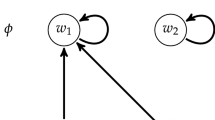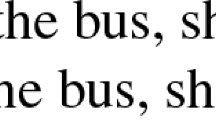Abstract
In contemporary discussions of the Ramsey Test for conditionals, it is commonly held that (i) supposing the antecedent of a conditional is adopting a potential state of full belief, and (ii) Modus Ponens is a valid rule of inference. I argue on the basis of Thomason Conditionals (such as ‘If Sally is deceiving, I do not believe it’) and Moore’s Paradox that both claims are wrong. I then develop a double-indexed Update Semantics for conditionals which takes these two results into account while doing justice to the key intuitions underlying the Ramsey Test. The semantics is extended to cover some further phenomena, including the recent observation that epistemic modal operators give rise to something very like, but also very unlike, Moore’s Paradox.
Similar content being viewed by others
References
Arló Costa H., Levi I. (1986) Two notions of epistemic validity. Synthese 109(2): 217–262
Beaver D.I. (2001) Presupposition and assertion in dynamic semantics. CSLI Publications, Stanford, CA
Bennett J. (2003) A philosophical guide to conditionals. Oxford University Press, Oxford
Chalmers D.J., Hájek A. (2007) Ramsey + Moore = God. Analysis 67(2): 170–172
Edgington D. (1995) On conditionals. Mind 104(414): 235–329
Fuhrmann A. (1989) Reflective modalities and theory change. Synthese 81(1): 115–134
Gärdenfors P. (1986) Belief revisions and the Ramsey test for conditionals. Philosophical Review 95(1): 81–93
Gillies A. (2001) A new solution to Moore’s paradox. Philosophical Studies 105(3): 237–250
Gillies A. (2004a) Epistemic conditionals and conditional epistemics. Noûs 38(4): 585–616
Gillies A. (2004b) New foundations for epistemic change. Synthese 138(1): 1–48
Gillies A. (2006) What might be the case after a change in view. Journal of Philosophical Logic 35(2): 117–145
Groenendijk J., Stokhof M., Veltman F. (1996) Coreference and modality. In: Lappin S. (eds) Handbook of contemporary semantic theory. Blackwell, Oxford, pp 179–214
Hansson S.O. (1999) A textbook of belief dynamics: Theory change and database updating. Kluwer Academic Press, Dordrecht
Jackson F. (1987) Conditionals. Basil Blackwell, Oxford
Levi I. (1977) Subjunctives, dispositions and chances. Synthese 34(4): 423–455
Levi I. (1980) The enterprise of knowledge. MIT Press, Cambridge, MA
Levi I. (1988) Iteration of conditionals and the Ramsey test. Synthese 76(1): 49–81
Levi I. (1996) For the sake of the argument. Cambridge University Press, New York
Lewis, D. K. (1986). Postscripts to probability of conditionals and conditional probability. In D. Lewis (Ed.), Philosophical papers (Vol. 2, pp. 152–156). New York: Oxford University Press.
Lowe E. (1987) Not a counterexample to Modus Ponens. Analysis 47(1): 44–47
McGee V. (1985) A counterexample to Modus Ponens. The Journal of Philosophy 82(9): 462–471
Ramsey, F. P. (1990). General propositions and causality. In D. H. Mellor (Ed.), Philosophical papers. Cambridge: Cambridge University Press, pp. 145–163.
Rott H. (2001) Change, choice and inference. Oxford University Press, New York
Shoemaker S. (1995) Moore’s paradox and self-knowledge. Philosophical Studies 77(2-3): 211–228
Sinnott-Armstrong W., Moor J., Fogelin R. (1986) A defense of Modus Ponens. The Journal of Philosophy 83(5): 296–300
van der Does J., Groeneveld W., Veltman F. (1997) An update on might. Journal of Logic, Language and Information 6(4): 361–380
van Fraassen B. (1980) ‘Review of Brian Ellis, Rational belief systems’. Canadian Journal of Philosophy 10(3): 497–511
Veltman F. (1996) Defaults in update semantics. Journal of Philosophical Logic 25(3): 221–261
Woods, M. (1997). Conditionals. Oxford: Clarendon Press. Edited by David Wiggins, with a commentary by Dorothy Edgington.
Yalcin S. (2007) Epistemic modals. Mind 16(464): 983–1026
Author information
Authors and Affiliations
Corresponding author
Rights and permissions
About this article
Cite this article
Willer, M. New surprises for the Ramsey Test. Synthese 176, 291–309 (2010). https://doi.org/10.1007/s11229-009-9494-z
Received:
Revised:
Accepted:
Published:
Issue Date:
DOI: https://doi.org/10.1007/s11229-009-9494-z




